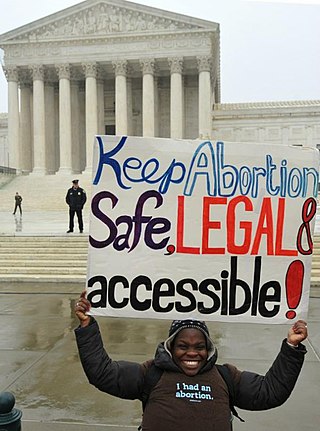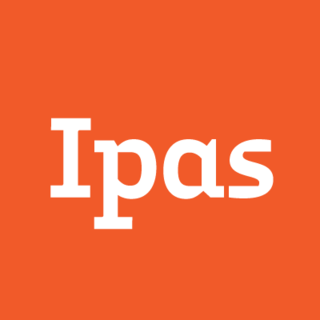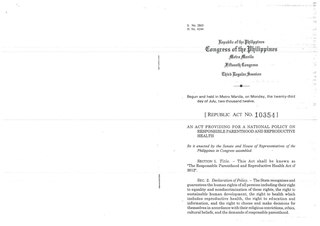Related Research Articles

Family planning is the consideration of the number of children a person wishes to have, including the choice to have no children, and the age at which they wish to have them. Things that may play a role on family planning decisions include marital situation, career or work considerations, financial situations. If sexually active, family planning may involve the use of contraception and other techniques to control the timing of reproduction.
Reproductive rights are legal rights and freedoms relating to reproduction and reproductive health that vary amongst countries around the world. The World Health Organization defines reproductive rights as follows:
Reproductive rights rest on the recognition of the basic right of all couples and individuals to decide freely and responsibly the number, spacing and timing of their children and to have the information and means to do so, and the right to attain the highest standard of sexual and reproductive health. They also include the right of all to make decisions concerning reproduction free of discrimination, coercion and violence.
An abortion clinic or abortion provider is a medical facility that provides abortions. Such clinics may be public medical centers, private medical practices or nonprofit organizations such as Planned Parenthood.

Sexual and reproductive health (SRH) is a field of research, health care, and social activism that explores the health of an individual's reproductive system and sexual well-being during all stages of their life.

A crisis pregnancy center (CPC), sometimes called a pregnancy resource center (PRC) or a pro-life pregnancy center, is a type of nonprofit organization established by anti-abortion groups primarily to persuade pregnant women not to have an abortion. In the United States, CPCs that qualify as medical clinics may also provide pregnancy testing, sonograms, and other services, while many others operate without medical licensing under varying degrees of regulation.

The Freedom of Access to Clinic Entrances Act is a United States law that was signed by President Bill Clinton in May 1994, which prohibits the following three things: (1) the use of physical force, threat of physical force, or physical obstruction to intentionally injure, intimidate, interfere with or attempt to injure, intimidate or interfere with any person who is obtaining an abortion, (2) the use of physical force, threat of physical force, or physical obstruction to intentionally injure, intimidate, interfere with or attempt to injure, intimidate or interfere with any person who is exercising or trying to exercise their First Amendment right of religious freedom at a place of religious worship, (3) the intentional damage or destruction of a reproductive health care facility or a place of worship.
Abortion is illegal in the Philippines.
Unite for Reproductive & Gender Equity (URGE) is a national youth-led reproductive rights and justice non-profit organization in the United States based in Washington, D.C. that began as Choice USA in 1992. Choice USA changed its name to URGE in July 2014.

Reproductive justice is a critical feminist framework that was invented as a response to United States reproductive politics. The three core values of reproductive justice are the right to have a child, the right to not have a child, and the right to parent a child or children in safe and healthy environments. The framework moves women's reproductive rights past a legal and political debate to incorporate the economic, social, and health factors that impact women's reproductive choices and decision-making ability.
Violence against women in the Philippines includes different forms of gender-based violence. The term "violence against women" is "the word or concept (that) has been used in a broad, inclusive manner to encompass verbal abuse, intimidation, physical harassment, homicide, sexual assault, and rape." This form of violence is gender-biased. Violence occurs precisely because of their gender, specifically because the victims are women.

Ipas is an international, non-governmental organization that seeks to increase access to safe abortions and contraception. To this end the organization informs women how to obtain safe and legal abortions and trains relevant partners in Africa, Asia, and Latin America on how to provide and advocate for these.

The Responsible Parenthood and Reproductive Health Act of 2012, also known as the Reproductive Health Law or RH Law, and officially designated as Republic Act No. 10354, is a Philippine law that provided universal access to methods on contraception, fertility control, sexual education, and maternal care in the Philippines.
The Kababaihan Gabay ng Bayan - KAGABAY, means "women supporting the country" in Filipino. KAGABAY is a non-government, non-profit, social development organization. It was set up to address poverty reduction through the social, political and economic empowerment of women in urban poor and resettlement communities. With its motto: “Kababaihan Para Sa Kababaihan", KAGABAY aims to contribute to the achievement of the country’s Millennium Development Goals through the empowerment of women that will enable them to address the multi‐faceted dimensions of poverty within their communities.

CHOICES Center for Reproductive Health is an independent, nonprofit reproductive and sexual health provider and was the first abortion clinic in Memphis, Tennessee.
The Feminist Women's Health Center of Atlanta is a feminist health center that provides comprehensive gynecological health care, engages in community outreach, and advocates for reproductive justice. Kwajelyn Jackson has served as the executive director since 2018.
The Feminist Abortion Network (FAN) is a national consortium of independent, feminist, not-for-profit abortion care providers. Although more than fifty such health care providers once existed, today fourteen clinics remain in operation. FAN was formed in 2006 to promote information-sharing, cross-organizational strategizing and improve the overall efficacy and reach of the member clinics.
Women's reproductive health in Russia refers to the set of physical, mental, and social health issues and services available to women in Russia. It includes the rights, laws, and problems experienced by women and their families regarding proper reproductive health. Women account for over half of the Russian population and are considered a vulnerable population due to political and social problems from inequalities in gender, age, socioeconomic status, and geographical location that affect access to comprehensive health care. As Russia struggles with a decreasing birthrate and increase in STIs, HIV, and poor reproductive health care, the need for government financed services and international programs is essential to successfully reach this vulnerable population. Currently, women in Russia access care through government funded free services, private insurance, and NGO programs.

Abortion in Kenya is prohibited with the exception of certain circumstances including danger to the life and health of the expectant mother, and rape. Unsafe abortions are a major cause of deaths and health complications for women in Kenya.
Abortion in Malaysia is generally legal to save the life of the mother or in cases where their physical or mental health is at risk, for the first 120 days of gestation, as regulated under Sections 312–316 of the Penal Code. However, specific legislation varies by state. Access to abortion in Malaysia has been hampered by religious, cultural and social stigmas against abortion, poor awareness of abortion legislation among health professionals and the high cost of abortion services in the private health sector. As a result, risky unsafe abortions are prevalent in Malaysia.

The status of women in Zambia has improved in recent years. Among other things, the maternal mortality rate has dropped and the National Assembly of Zambia has enacted multiple policies aimed at decreasing violence against women. However, progress is still needed. Most women have limited access to reproductive healthcare, and the total number of women infected with HIV in the country continues to rise. Moreover, violence against women in Zambia remains common. Child marriage rates in Zambia are some of the highest in the world, and women continue to experience high levels of physical and sexual violence.
References
- 1 2 Sheker, Manini (23 November 2011). "Smaller families planned". The Guardian. Retrieved 27 August 2014.
- ↑ Mirsky, Judith; Radlett, Marty (2000). No Paradise Yet: The World's Women Face the New Century. ISBN 9781856499224.
- ↑ "Likhaan Center for Women's Health" . Retrieved 26 August 2014.
- 1 2 "Likhaan and the struggle for reproductive rights in the Philippines". Canadian Women's Health Organization. 26 November 2012. Retrieved 26 August 2014.
- ↑ Chandiramani, ed. Geetanjali Misra, Radhika (2005). Sexuality, gender, and rights : exploring theory and practice in South and Southeast Asia. New Delhi [etc.]: Sage Publications. p. 157. ISBN 0761934022.
{{cite book}}:|first1=has generic name (help)CS1 maint: multiple names: authors list (link) - ↑ "Exposed: Three pro-RH groups backing legalized abortion". CBCP for Life: Online Resource Portal for Family and Life. 5 September 2011. Retrieved 26 August 2014.
- ↑ Diola, Camille (12 December 2012). "Pro-RH cooks 'electoral campaign' vs anti-RH solons". PhilSTAR.com. Retrieved 27 August 2014.
- 1 2 3 Luna, Nikki (13 August 2012). "Paradise Village: Why the RH bill should be passed". Rappler. Retrieved 28 August 2014.
- 1 2 Strother, Jason (30 March 2013). "Mixed reception for Philippines birth control law". Deutsche Welle. Retrieved 27 August 2014.
- ↑ "Demystifying Abortion for Young Women in The Philippines" (PDF). The Asian-Pacific Resource & Research Centre for Women. 2006. Archived from the original (PDF) on 26 August 2014. Retrieved 26 August 2014.
- ↑ Faustino, Pia (4 August 2010). "RH law will reduce abortion, women's health advocates say". GMANews.TV. Retrieved 26 August 2014.